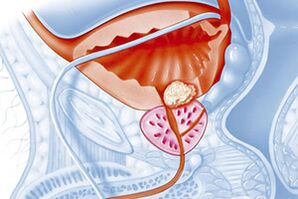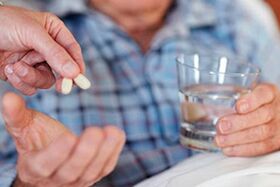Chronic prostatitis is an inflammatory disease characterized by changes in the organic tissue of the prostate gland and functional disorders of the prostate, male reproductive system and urinary tract.

The prostate is a tubular alveolar gland found only in men. This gland is involved in sperm production and is located under the bladder around the beginning of the urethra. In men, chronic prostatitis can occur due to infection of the prostate gland from the bladder through the blood and lymph vessels of the pelvis, or in some other way. The presence of an infection may not cause illness or impotence, but generally does not pass for a man without a trace. At this time, men experience a decrease in penile stiffness, sexual dysfunction and urinary incontinence.
Chronic prostatitis is not life-threatening, but can still cause psychological distress and family breakdown. According to experts, chronic prostatitis, ie untimely treatment, can lead not only to the development of serious complications, but also to prostate cancer. Indeed, in addition to infection, there are a number of other factors that predispose to chronic prostatitis. However, the manifestations and exacerbations of chronic prostatitis have different characteristics.
Stages of chronic prostatitis
Although there is still no single specificity for the development of chronic prostatitis, experts distinguish the following types:
- I acute bacterial prostatitis;
- II prostatitis of bacterial genesis. The most common;
- III chronic non-bacterial prostatitis is a symptom complex of chronic pelvic pain lasting more than 3 months;
- category III A is an inflammatory type of chronic prostatitis with increased levels of leukocytes in prostate secretion;
- III B is a non-inflammatory form of chronic prostatitis without increased levels of leukocytes and pathogens in prostate secretion;
- Type IV is diagnosed as asymptomatic chronic prostatitis, which does not cause pain and is detected quite randomly by analysis of prostate secretion or its biopsy.
The frequency and causes of chronic prostatitis in this category are still unknown. As for the causes of other types of disease, it should be noted that they are associated with the penetration of various infectious microorganisms into the urine, as well as the violation of various functions in the male body.
Prophylactic methods of prostatitis
Chronic prostatitis requires long-term treatment. Therefore, it is better to take preventive measures to prevent it. To do this, the patient not only needs to make some lifestyle adjustments, which are not only beneficial for the overall health condition, but also will eliminate the disease. Thus, the following prevention rules should be followed first:
- try to lead a healthy lifestyle;
- completely exclude spicy foods from the diet;
- do not abuse alcohol;
- play sports, including sports that help strengthen muscles and improve blood circulation in the pelvic organs;
- voluntarily participate in yoga classes;
- to follow the methods of prevention and treatment of infectious diseases;
- eliminate pelvic obstruction and treat rectal diseases immediately;
- exclude excessive masturbation;
- try to live a regular but safe sex life;
- avoid hypothermia;
- do not sit on cold surfaces;
- warm up more often during sedentary work.
In addition to these preventative measures, men should be aware that chronic prostatitis is insignificant. Therefore, if a man notices a discharge during urination or defecation and feels a slight pain, it is necessary to consult a doctor immediately. It should also be remembered that the course of treatment should be carried out under the supervision of a specialist without any negligence. In addition, the choice of medication during antibiotic therapy is made according to the individual condition of the patient and only after special examinations. Prescribed medications should not be discontinued, and more should not be taken without a doctor's prescription. Do not delay your doctor's appointment. By searching our website, you can easily find a clinic that suits both location and pricing policy.
Causes of prostatitis
In medicine, chronic prostatitis is considered a polyetiological disease. In addition to the penetration of infection into the ureteral organs, the development of neurovegetative and hemodynamic diseases, as well as the weakening of the immune system and autoimmune, hormonal or biochemical processes can cause and recur. Inflammation of the prostate gland can develop against the background of the following diseases.
- depression;
- bladder dysfunction;
- reflex sympathetic dystrophy;
- inflammatory processes of nearby organs;
- bladder neck hypertrophy;
- prostate adenoma;
- narrowing of the urethra;
- diseases of the rectum.
Given these factors, the following reasons are associated with the risk of developing prostatitis:
- a sedentary lifestyle, especially in a sitting position, leads to disruption of blood supply to the pelvic organs;
- local hypothermia of the body;
- frequent constipation;
- irregular sex or a sudden force;
- chronic infections;
- previous sexually transmitted diseases. In particular, delaying treatment;
- malnutrition;
- lack of sleep;
- chronic stress.
In addition, chronic non-bacterial prostatitis can be caused by injuries during illness and the formation of myofascial trigger points during pelvic organ surgery.
Symptoms of chronic prostatitis

Symptoms of chronic prostatitis do not bother the man much. Inflammation of the prostate occurs suddenly. The patient may be concerned about acute pain in the perineum and groin area, and may also experience pain during urination and defecation accompanied by urination. All these symptoms of chronic prostatitis can be accompanied by fever, chills and fever. Often these symptoms are intermittent. In addition, chronic prostatitis can be expressed in the form of complications of sexually transmitted diseases. During the course of the disease, the patient may feel discomfort when urinating, pain in the perineum and the appearance of discharge. Chronic inflammation of the prostate causes erectile dysfunction and delayed ejaculation.
The inflammatory process of the prostate moves deep into the urinary system, which can lead to cystitis and pyelonephritis. Often, these exacerbations result in inflammation of the testicles and appendages, which leads to infertility and requires long-term treatment. Therefore, you should not delay going to the doctor. Timely diagnosis and treatment are required. It is important to remember that chronic prostatitis can be treated if it does not cause the disease.
Diagnosis of chronic prostatitis
As a rule, the doctor can prescribe this or that type of chronic prostatitis based on the patient's complaints or after the examination. The specialist first palpates the prostate gland and then recommends that the patient perform a laboratory examination of the urine cult tank and prostate secretion. This diagnosis allows you to determine the further treatment of chronic prostatitis. In addition, the urologist can apply diagnostic methods as follows.
- transrectal ultrasound, which allows to determine the size and volume of the prostate, as well as the presence of neoplasms;
- Determination of the urethral pressure profile allows to study the cause of urinary disorders and the functions of the pelvic floor muscles;
- microscopic examination of the rupture of the mucous membrane of the urethra, which helps to determine the presence of a specific flora that causes infectious diseases; prostate radiography;
- MRI of the pelvic organs, which helps to differentiate between prostate cancer and also identifies a non-inflammatory type of bacterial prostatitis;
- Determination of the state of humoral and cellular immunity in prostate secretion. Such research helps not only to diagnose the category of inflammatory process of the prostate gland, but also to address the question of what method can be used to treat chronic prostatitis.
Treatment of chronic prostatitis
Chronic prostatitis is considered a cunning and complex disease, its method of treatment requires a holistic approach. Urologists use the following treatments.
- Antibiotic therapy, during which drugs are prescribed to destroy the latent microorganisms of the infection. The patient takes this medication for several weeks. In the absence of an appropriate effect, antibiotics may be replaced by another group of drugs;
- physiotherapy may include exposure to electromagnetic, ultrasound, and laser waves, which significantly increases the effectiveness of antibiotic therapy;
- magnetic laser therapy has a congestive effect and improves blood microcirculation in the pelvic organs;
- Transrectal prostate massage is the most painful and distressing treatment, but also the most effective. It is based on the elimination of inflammatory secretions by squeezing with a finger;
- darsonvalization;
- electrophoresis with drugs;
- hormone therapy;
- transurethral electrosurgery. This method of treatment can be used only in a person with complications that lead to the onset of sclerosis in the neck of the prostate and bladder, in addition to impaired urinary excretion or reproductive function. If there is an exacerbation of the chronic inflammatory process after surgery, in this case, all the remaining glands in the patient can be removed;
- Immunocorrection is aimed not only at eliminating the infection, but also at completely eliminating its manifestation. This method of treatment involves the normalization of an active lifestyle, regular walks, adherence to a daily routine and a healthy lifestyle;
- Spa treatment.
In addition, treatment prescribed for chronic prostatitis may include a visit to an immunologist and additional special tests. The end of this or that course of therapy does not guarantee the complete eradication of prostatitis infection, so it is likely to recur. To treat chronic prostatitis, the patient must strictly follow all the recommendations of the doctor and complete the prescribed course of treatment.





































